Yes, one of the most popular comedians of all time was Marshall Pinckney Wilder.1 At least he was in the years around the fin de siècle.2 If perhaps not THE favorite comedian of King Edward VII of England, he was certainly ONE OF THE FAVORITES of the King.
Footnote
Marshall Pinckney Wilder (1859-1915) the comedian is not to be confused with the Marshall Pinckney Wilder the Massachusetts state senator (1798-1886).

King Edward VII - Bertie
Marshall was a favorite.
Marshall, though, was an American. He was born in 1859 and as a young boy showed natural talent for performance and comedy. By 1885 he was performing professionally and was on his way to superstardom. When he died in 1915 age 55, Marshall was one of the most famous men in the world and was quite literally a household word.
Comedians Legion

The Brothers
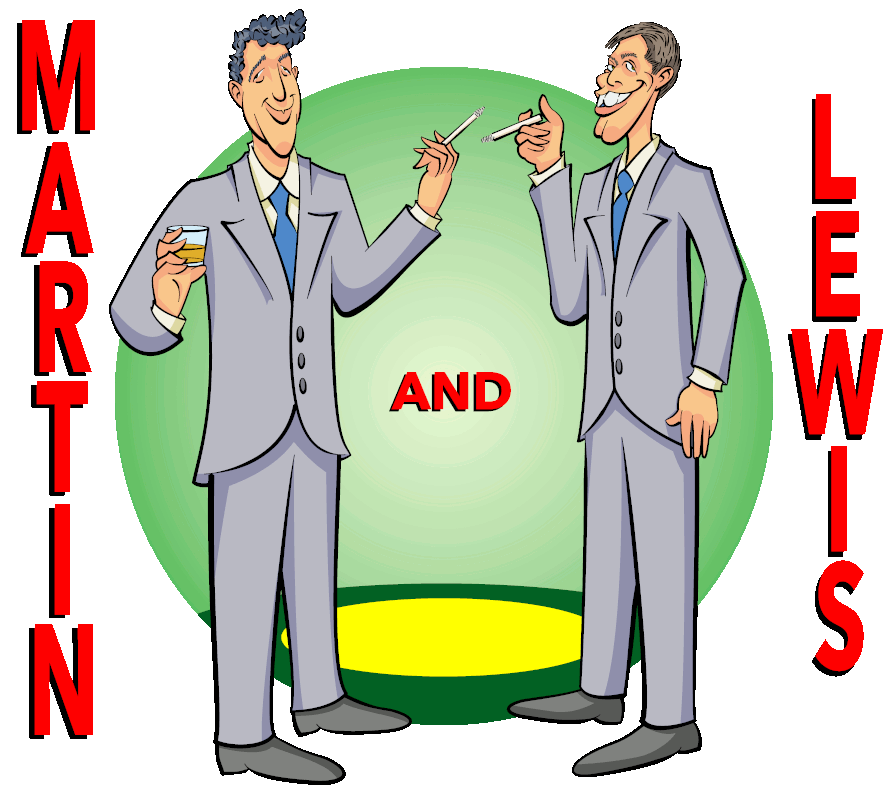
Jerry (right) and Frien

Mel Brooks
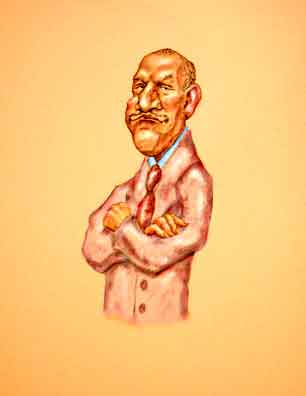
Redd Foxx
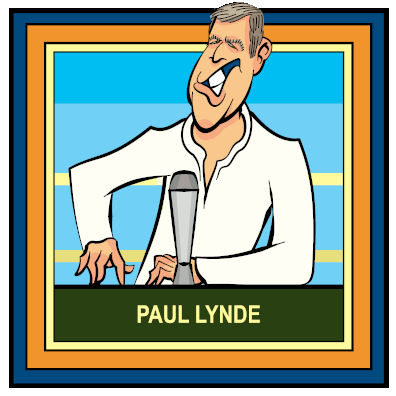
Paul Lyonde
The Center Square
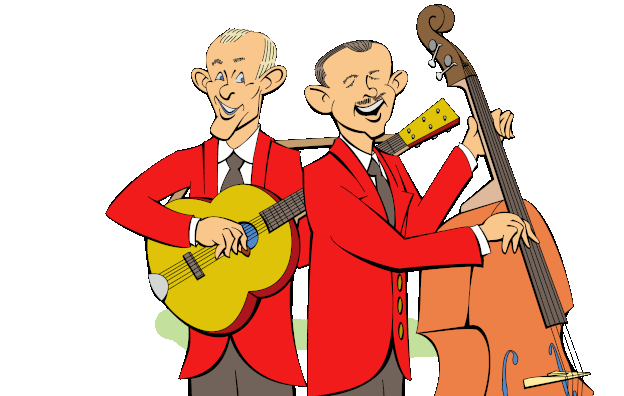
Tom and Dick Smothers
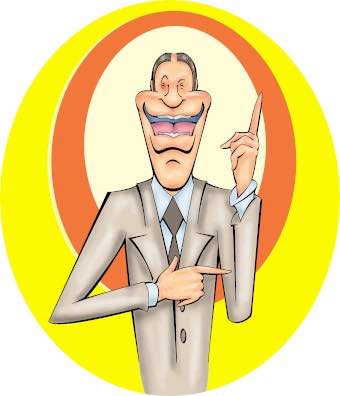
Joe E. Brown
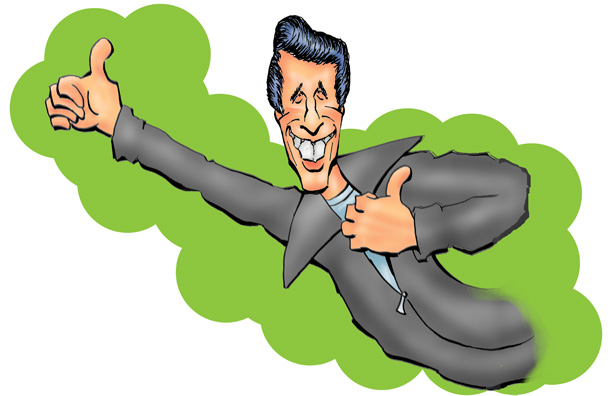
The Fonz
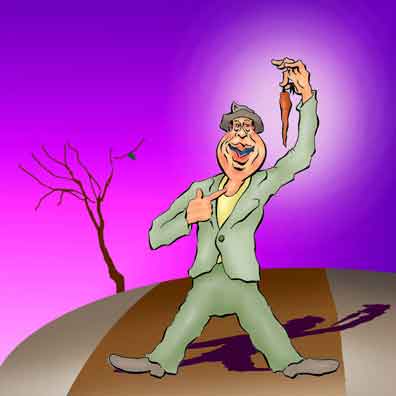
Bert Lahr
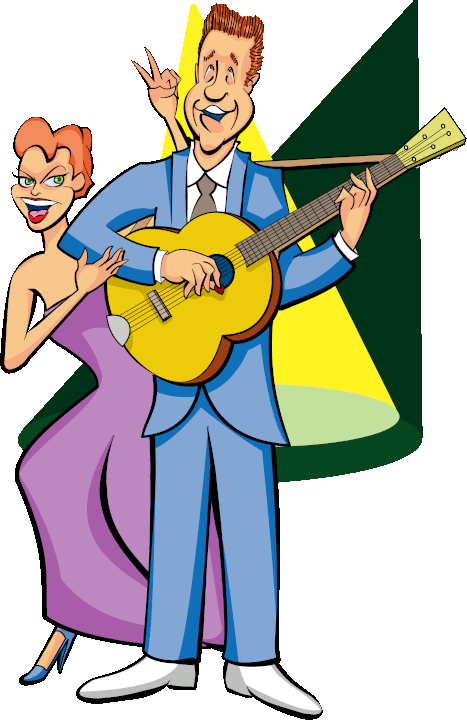
George Gobel and Peggy King
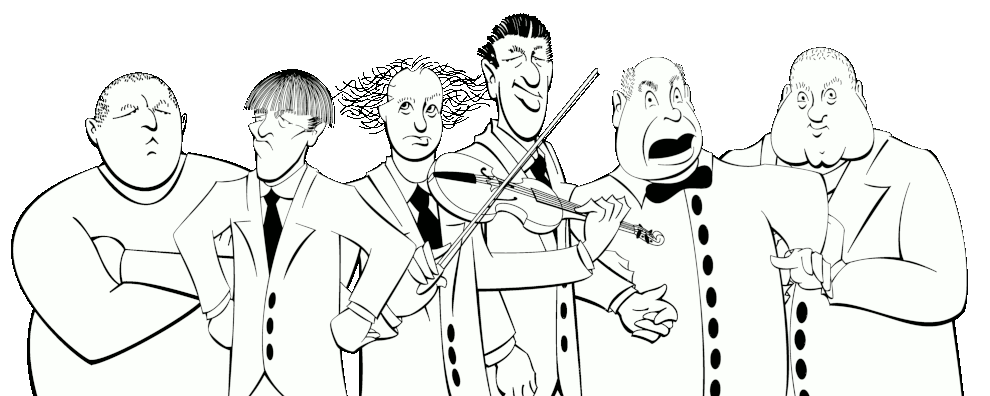
The Three Six Stooges

Mel and Sue
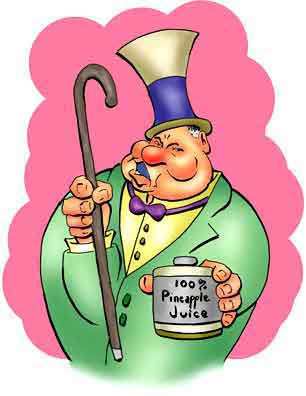
W. C.
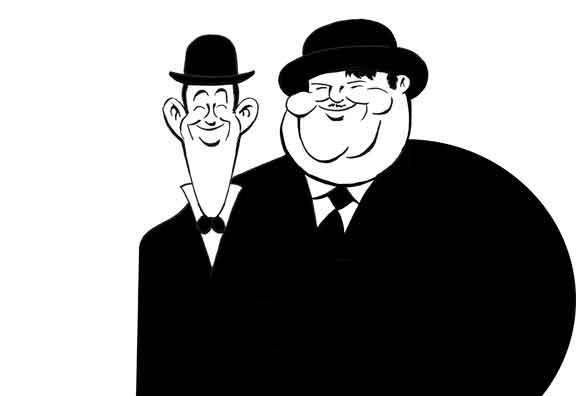
Stan and Ollie
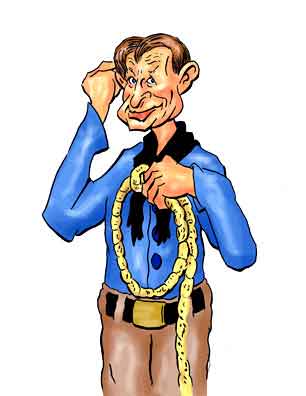
Will
Cowboy Philosopher
So why has Marshall has been all but forgotten? Why shouldn't he be remembered along with the other groundbreaking comedians like The Marx Brothers, Jerry Lewis, Mel Brooks, Redd Foxx, Paul Lynde, Tom and Dick Smothers, Joe E. Brown, Henry Winkler (The Fonz), Bert Lahr, George Gobel, The Three Stooges (all six of them), and Mel Giedroyc and Sue Perkins?
The sad truth is that virtually all performers before the 1920's have been forgotten. It wasn't until radio, motion pictures, and television began to preserve their talents for later generations that their talents were, well, were preserved for later generations. Earlier celebrities vanished with their live performances and even megastars like Michael aren't remembered.
Yes, there are exceptions but these are remembered because of other accomplishments. For instance Franz Liszt and Niccolò Paganini were not just musical virtuosi but were also composers whose works are still performed. Henry Irving was an actor of the 19th century but also has the historical importance of being the first actor to receive a knighthood. Ellen Terry acted with Henry but she was also a theatrical manager was vital in promoting the plays of George Bernard Shaw, one of which served as the basis for the hit musical My Fair Lady. And Edwin Booth was not only one of the most famous actors in his day but had, well, an association that insures his inclusion in accounts of American history.
It's certainly wrong to think that in the Victorian Era people went to the theater just to see grand opera and Shakespeare. The Victorian Era saw the beginning of vaudeville - called the music halls in England - was where a number of acts were staged one after another and each one taking a few minutes. And in between the song-and-dance teams, conjurers, and the minstrel acts, a "monologist" would come on stage and tell jokes. Marshall toured the vaudeville circuit and was what we now call a stand-up comedian. Had he been born late enough to appear on the early electronic equivalent of vaudeville - the now defunct "variety show" radio programs - he would probably be remembered along with Will Rogers, W. C. Fields, Fred Allen, and Jack Benny.
Marshall suffered from both dwarfism and kyphosis, the later condition then and often now referred to as a "hunchback". His disorders produced chronic pain but this wasn't obvious to Marshall's audiences. On the contrary, he was noted for his light hearted banter and cheerfulness. His disabilities never became an integral part of his act and he insisted on performing only in the mainstream theaters. The critics judged him on the quality of his comedy and monologues not his appearance and inevitably Marshall received rave reviews.
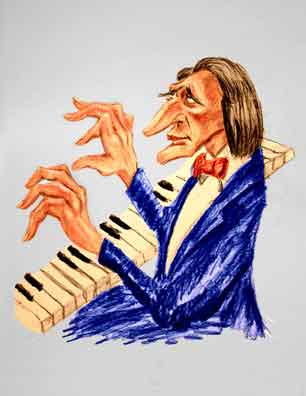
Franz Liszt
Marshall, though, had other talents which if not for the changing standards of humor might have given him fame as a scholar of American culture. In 1905 he published "The Sunny Side of the Street" a set of stories about humorists and celebrities of his time. He also complied and edited ten volumes of humorous writings The Wit and Humor of America which was also published as The Ten Volumes of Merrymakers. These books included humorous stories and verse from famous authors including - and to skip this rather lengthy and laborious list just click here) - James T. Fields, Stanley Waterloo, George Ade, Benjamin Stevenson, Max Adeler (Charles Heber Clark), John Habberton, James Ball Naylor, Edmund Clarence Stedman, Harold MacGrath, Strickland W. Gillilan, Carroll Watson Rankin, J. F. Kelley, May Isabel Fisk, B. F. Strother, William Russell Rose, Porte (see Crayon, Samuel Minturn Peck, Ralph Waldo Emerson, J. Proctor Knott, Eugene Field, Emerson Hough, Carolyn Wells, Bayard Taylor, May McHenry, J. T. Trowbridge, James Whitcomb Riley, William Vaughn Moody, Hayden Carruth, Thomas Bailey Aldrich, George P. Morris, John B. Tabb, Myra Kelly, Richard Hovey, Henry J. Finn, John Greenleaf Whittier, Robert J. Burdette, Gail Hamilton Mary Abigail Dodge), John Paul Charles Henry Webb), George William Curtis, Frances M. Whicher, Henry Guy Carleton, Thomas Bangs Thorpe, Nathaniel Hawthorne, Sam (see Slick, Joel Chandler Harris, Joseph I. Clarke, Edmund Vance Cooke, Bliss Carman, James L. Ford, Edward Everett Hale, S. E. Kiser, Anne Warner (Anne Warner French), Warwick S. Price, Sol Smith, Albert Gorton Greene, Mrs. Partington (B. P. Shillaber), John James Davies, C. W. M., B. P. Shillaber, Quad (Charles B. Lewis), Kenyon Cox, Charles Follen Adams, Jennie Betts Hartswick, James Russell Lowell, Nixon Waterman, William J. Lampton, Walt Whitman, Doane Robinson, George Horace Lorimer, Charles B. Lewis, Harriet Prescott Spofford, F. Hopkinson Smith, Charles H. Smith, Owen Wister, Opie Read, Ellen Mackay Cortissoz, George W. Bagby, Sarah P. Greene, Ernest Lawrence Thayer, Allen's Wife Josiah, Oliver Wendell Holmes, Harriet Beecher Stowe, Nina R. Allen, O. Henry (Sydney Porter), Lucretia P. Hale, Baynard Rust Hall, J. J. Hooper, Seba Smith ("Major Jack Downing"), Robert W. Chambers, Bert Leston Taylor, Henry Harland, William Devere, Gelett Burgess, Herman Knickerbocker Vielé, H. W. Boynton, Charles Godfrey Leland, Billy (see Baxter, J. K. Wetherill, Elizabeth Stuart Phelps, George Thomas Lanigan, Joseph G. Baldwin, T. C. Haliburton, Tom Masson, Henry P. Leland, Jack Appleton, Francis Bret Harte, John Boyle O'Reilly, Charlotte Perkins Gilman, Henry Ward Beecher, Alice MacGowan, John Kendrick Bangs, J. W. Foley, George V. Hobart "Hugh McHugh", Edwin L. Sabin, George H. Derby, George V. Hobart, Finley Peter Dunne, A. H. Laidlaw, Phoebe Cary, Maurice Smiley, Alfred Henry Lewis, Elizabeth Hyer Neff, Frederick S. Cozzens, Charles E. Carryl, William J. Kountz, Wallace Rice, John Philip Sousa, John Hay, Daniel O'Connell, Caroline Howard Gilman, John T. McIntyre, Charles F. Lummis, Mark Twain (Samuel L. Clemens), William Dean Howells, William Cullen Bryant, John Luther Long, Sam S. Stinson, Artemus Ward (Charles Farrar Browne), Josh Billings (Henry W. Shaw ), Mr. Dooley (Finley Peter Dunne), Ray Clarke Rose, Sewell Ford, Kate Field, J. V. Belden, Edgar Wilson Nye, Henry Wadsworth Longfellow, Charles Dudley Warner, Frank Roe Batchelder, Ed Mott, Charles Farrar Browne, Clinton Scollard, Benjamin Franklin, Danforth Marble, Wilbur D. Nesbit, R. K. Munkittrick, Charlotte Becker, Ellis Parker Butler, Edward W. Townsend, Madeline Bridges, James Montgomery Flagg, Francis Lynde, David Ross Locke, Roy Farrell Greene, Henry A. Shute, Lloyd Osbourne, "Josiah Allen's Wife" (Marietta Holley), John Phoenix (George H. Derby), Edward Rowland Sill, William Allen Butler, Alan Dale, John Challing, Charles F. Johnson, Anne Warner French, Reginald Wright Kauffman, Charles Raymond Macauley, William Henry Drummond, Juliet Wilbor Tompkins, James Jeffrey Roche, Petroleum V. Nasby, St. John Honeywood, "Octave Thanet" (Alice French), Charles Battell Loomis, Charles Henry Webb, Elliott Flower, Mary Abigail Dodge, E. W. Howe, Washington Irving, Holman F. Day, (see Eugene Ironquill, Ironquill (Eugene F. Ware)m Helen Avery Cone, E. O. Laughlin, Wallace Bruce Amsbary, Benjamin F. Taylor, Thomas Ybarra, Wallace Irvin, Kennett Harris, Mary F. Tucker, Edward Eggleston, James Montgomery Bailey, Elizabeth Stuart Ward, Howard V. Sutherland, John G. Saxe, Alden Charles Noble, Frank Crane, George Randolph Chester, Eugene F. Ware, Herbert Quick, David Gray, Sam Walter Foss, Eliza Leslie, Katharine M. Roof, Oliver Herford, Mary Stewart Cutting, A. B. Longstreet, Frank L. Stanton, Horace E. Scudder, Widow Bedott (Frances M. Whicher), Bill Arp (Charles Smith), Nicholson Meredith, and the highly prolific Anonymous. These books give us a good idea of what made people laugh in the Victorian and Edwardian Eras. But the one humorist Marshall omitted was - Marshall Pinckney Wilder! (To return to the top of the list click here.)
Unfortunately the fickle nature of what makes people laugh has prevented these historically important volumes from translating into enduring fame for the author and editor. Because understanding the jokes of the various authors requires familiarity with the culture and issues of the day, as like as not their writings will be met with head scratching incomprehensibility rather than brays of appreciative laughter. With a few exceptions - Benjamin Franklin (Poor Richard's Almanac), Washington Irving (The Legend of Sleepy Hollow and Rip Van Winkle), Mark Twain (Tom Sawyer and Huckleberry Finn) - few of the authors cited are read today. So Marshall's books have fallen out of today's reading lists.
Although Marshall never made his disabilities part of his act, he could joke about his short stature. As the writer and artist Elbert Hubbard reported:
The first time Marshall arrived here, he came up to me and said in a James Whitcomb-Riley voice, "Pa couldn't come, and so he sent me!"3
Footnote
The reference to a "James Whitcomb-Riley voice" refers to James's writings being primarily for children. In his performances Marshall would sometimes mimic the voice of a young child in conversation with adults.
Elbert Hubbard was a popular American writer and artist who was one of the leaders of the 19th Century Arts and Craft Movement whose members championed traditional arts over the new emerging modernistic trends like Art Nouveau. Elbert established the Roycroft Art Colony in New York near Buffalo in 1895. The Colony did well but sadly began to decline after Elbert and his wife were among the American casualties when the English ocean liner RMS Lusitania when it was sunk off the coast of County Cork, Ireland, on May 7, 1915.
Another story Elbert told was when he and Marshall were traveling together. Elbert also had no qualms about using his friend's small stature to his advantage.
That was the time I took the little man to New York with me on a half rate ticket. Marshall and I are the same age.
The conductor came around and I handed him the tickets. He looked at me and looked at Marshall and then said,"How old is your son, Col. Little Journeys?"4
"He's seven all right!" I answered and gazed out the window indifferently, settling myself for a nap.
"He needs a shave," said the conductor as the punched the ticket and started on.
Footnote
A reference to Elbert's series of books titled Little Journeys to the Homes of the Great.
Marshall shared the regular - some say notorious - propensity which "Mr. Television" Milton Berle was later chided for. That is, Marshall would, well, he would "borrow" material from other comedians. This was learned by comedian Nat Godwin in 1891 when he and Marshall, although on separate tours in England, had appeared together at a private club.
A SAVAGE CLUB STORY
MARSHALL WILDER STEALS NAT GOODWINS'S CROP OF STORIES.
Barbers Make Merry of a Young Man in Skull Cap - How an Observeing Passenger Found Out That They Were a Newly Married Couple.
Nat Goodwin everybody knows; Marshall P. Wilder everybody knows. They are both excellent comedians and mimics. Mr. Wilder has what some people would call the disadvantage, being what others would call the great advantage of being a dwarf. He is an inimitable story teller, and is making a fortune for himself in London at the present moment. He and Nat Goodwin and Alan Forman went over together from America and Nat Goodwin was primed full of new stories, as he always is. He told them in the smoking room of the steamer coming over, and none appreciated them more than Mr. Marshall Wilder.
Wilder, when they landed in Liverpool, went straight to London. Goodwin stopped off at different places and did not reach the big city till a week later.
Both Goodwin and Wilder are honorary members of the Savage Club and always welcome. Every Saturday night the Savage Club has what it calls the club dinner, and an entertainment to follow. Marshall Wilder got up on being called on and told all of Nat Goodwin's stories, which were very well received.
The next Saturday night Mr. Goodwin was present and was loudly called for. He got up and said:
"Mr. Chairman and Gentlemen: Your hearty reception reminds me of a story of a man out in Texas who was tendered a reception—"
Here the chairman whispered huskily "Marshall Wilder told that story last Saturday."
Nat was a little nonplused, but he speedily gathered himself together and continued:
"Well, probably you have heard that story, but here is another that I think is new to this side of the water. Out to California there was a miner who had made his pile and—"
The chairman pulled his coattails "Marshall Wilder told that story last Saturday."
Goodwin gave a gasp and looked vindictively at Marshall P. Wilder, who was sitting in a corner hugely enjoying the discomfiture of the comedian.
"Gentlemen, " said Goodwin, "your chairman informs me that you have already had that story, but here is another that I remember at the moment. The last time that I was in Detroit 1 was up in the office of—"
The chairman whispered again: "Marshall Wilder told the Detroit story last Saturday."
The audience by this time was taking in the situation and a number of quiet chuckles were going the round. Goodwin stood for a moment before them speechless. Then he put up his right hand and drew his hair down over his brow. His face seemed to lengthen and his mouth widen. He appeared to shrink as he stood before them, and a hump seemed to come on his back as his head sank more and more between his shoulders, and, to the astonishment of everybody present, there stood Marshall P. Wilder before them, as he had done the Saturday night previous.
"Gentlemen," said Goodwin, in exact representation of Wilder's tones, "I will give you an imitation of that gifted humorist, Marshall P. Wilder, telling my stories in the Savage Club."
At this there was a wild roar of laughter and applause, and Goodwin nodded to Wilder as he sat down and said: "There, Marshall, I’ve got even with your for once." - Detroit Free Press.
Although not stated explicitly, the impression is that Marshall took the joke in stride.
Traveling today can be an onerous task but in Marshall's time, it could be an ordeal. He once pointed out that the life of a traveling solo performer was often not be be envied.
Years ago when I was on the lecture platform I used to have some cloudy hours, in spite of my efforts to be sunny, for, unlike theatrical people, lecturers are usually their own only traveling companions, the railway runs are long, the engagements are what the dramatic agents call "one night stands," so the stops are so short that the lecturer has no chance to adapt his digestive apparatus to the surprises that unknown chefs of unknown hotels delight in springing upon him.
In 1903 Marshall married Sophie Cornell Hanks and despite their difference in stature, the marriage was a happy one. Sophie herself was an author and no doubt provided valuable assistance with Marshall's books. Sophie and Marshall had two children, a daughter Grace and a namesake son, Marshall Pinckney, Jr. Grace grew up as an advocate for people with disabilities and Marshall, Jr., became an early inventor in the television industry. He helped develop the methods of visual electronic transmission and from 1936 to 1966 was listed as an inventor on twelve United States Patents.
During his lifetime Marshall garnered considerable wealth but unlike some of the nouveau riche performers he didn't squander it. He would make $600 a week in a day when $600 was a year's support for a family of four. By the 1890's he would tour in the summer in England and make about $4000 - again big money for the time. When he died at age 55 in 1915, Marshall left his children a cash estate of $250,000 - well over $10,000,000 in today's purchasing power. He even left a servant $500 which was about two years salary for a valet.
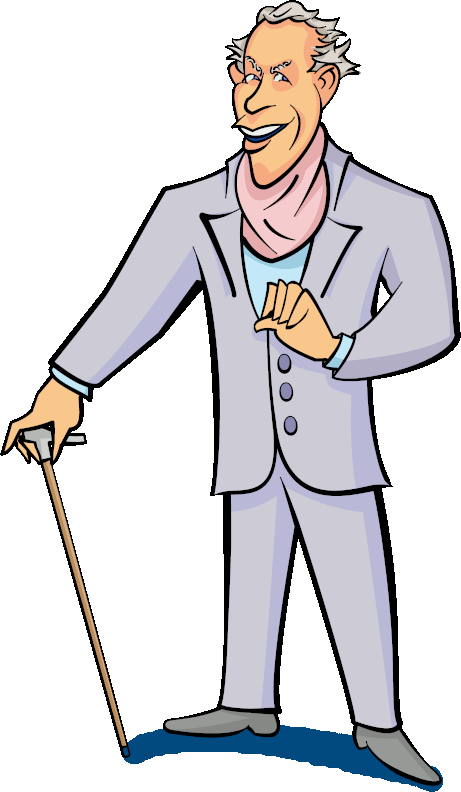
Michael Dunn
"Dr. Miguelito Quixote Loveless"
A later 20th Century counterpart to Marshall was the actor Michael Dunn. Michael was born in 1934 as Gary Neil Miller in Shattuck, Oklahoma. This is in the extreme western part of the state and when he was born Shattuck was in the heart of the Dust Bowl.5 So perhaps it's no surprise that the family soon relocated Michigan where he attended the University of Michigan and he later enrolled at the University of Miami.
Footnote
Ironically the quintessential story about the Dust Bowl makes a major faux pax in the plot. In the opening of The Grapes of Wrath the protagonist Tom Joad leaves the Oklahoma State Penitentiary at McAlester, Oklahoma, where he had served a term for manslaughter (it was self-defense, of course). He then hitchhikes to the family farm outside of Sallisaw.
There he finds the farm has been devastated by the Dust Bowl. With the crops ruined, the banks had foreclosed and the Joads are now penniless. So the family loads up their car and moves to California. There they struggle against prejudice against the "Okies".
The trouble with the story is that Sallisaw is in the extreme eastern part of the state and only about 20 miles from Fort Smith, Arkansas. It is in fact in the same area as the Cookson Hills which are part of the Boston Mountain Range which is in turn part of the America's Interior Highlands which include the Ozark Plateau. There was no Dust Bowl in Sallisaw and for that you had to go 300 miles to the west.
In fact, the citizens of Sallisaw managed fairly well during the Great Depression. It was largely an agricultural economy and although the work was hard, it was available for most of the citizens. Certainly life was better than for many dwellers of the big cities.
Like Marshall, Michael suffered from genetic dwarfism. However from an early age he showed both acting and singing talent and as a young man he moved to New York. It was in New York that he met Phoebe Dorin and they began performing in clubs as a singing duo. Michael also began appearing in plays and in 1965 he was nominated for a Tony Award for his role in The Ballad of a Sad Cafe.
Michael first appeared on television in the early 1960's and his first major film role was in 1965 in the star-studded film Ship of Fools. In the beginning and end of the picture, Michael breaks the fourth wall and speaks directly to the audience. His performance garnered him an Academy Award nomination. It was also in 1965 that Michael appeared in the pilot episode of Get Smart, "Mr. Big". On the show Michael played a KAOS criminal mastermind named (yes), Mr. Big.
But without doubt Michael's most famous role was as Dr. Miguelito Quixote Loveless in the series The Wild Wild West. Miguelito was one of the most popular of the many villains who matched wits with the Old West Secret Service agents James T. West and Artemus Gordon. Michael appeared in ten episodes over four years often with Phoebe Dorin as Miguelito's consort and singing partner. In Season 1 there was "The Night the Wizard Shook the Earth","The Night That Terror Stalked the Town","The Night of the Whirring Death", and "The Night of the Murderous Spring", all considered among the best of the series. In Season 2, Miguelito returned with "The Night of the Raven" (not the best of the shows), the entertaining "The Night of the Green Terror", "The Night of the Surreal McCoy" (with a rather unbelievable plot), and "The Night of the Bogus Bandits". Michael appeared two more times, once in Season 3 in "The Night Dr. Loveless Died" (where you know he'll be back), and finally in Season 4 in "The Night of Miguelito's Revenge".
Although his role as Dr. Loveless was Michael's tour de force he also played more sympathetic characters such as Alexander in "Plato's Stepchildren" in the original Star Trek series. He continued to perform in nightclubs, on stage, and on television, but when in London in 1973 he died suddenly at age 38. He was buried in Norman, Oklahoma.
When Marshall died in 1915 the news was reported throughout the world. His friend, Elbert Hubbard wrote his obituary (here edited for brevity):
Marshall P. Wilder is dead. He died as he should have died, and as he hoped to die - on the job! He was a walking refutation of that dogmatic statement, Mens sana in corpore sano
He picked up the lemons that Fate had sent him and started a lemonade-stand. And he never asked for pity. In fact, he scorned it, and if any one ever got his ill-will, it was because the party was too profuse in endeavors to help him.
If Marshall was ever cast down in spirit he concealed the mood. He laughed his way into our hearts.
Hail! dear little Marshall! Hail and Farewell! We are the poorer for your passing.
Today Elbert's sentence, "He picked up the lemons that Fate had sent him and started a lemonade-stand" is generally recast as "When life gives you lemons, make lemonade."6
Footnote
Elbert's full obituary is as follows:
Marshall P. Wilder is dead.
He died as he should have died, and as he hoped to die - on the job!
Happily, the world has passed forever from the time when we felt a sorrow for the dead. The dead are at rest, their work is done, their hands are folded-just so.
Marshall P. Wilder lived all his life in the shadow of the wing of Death.
He was a walking refutation of that dogmatic statement, Mens sana in corpore sano. His was a sound mind in an unsound body. He proved the eternal paradox of things. He cashed in on his disabilities. He picked up the lemons that Fate had sent him and started a lemonade-stand.
And he never asked for pity. In fact, he scorned it, and if any one ever got his ill-will, it was because the party was too profuse in endeavors to help him.
If Marshall was ever cast down in spirit he concealed the mood. He laughed his way into our hearts.
"I am the only man who ever deliberately walked into the office of a life-insurance company and demanded a policy," he used to say
Many of his stories turned on himself. For instance, one quip that never failed to get a laugh was this: "The other day I was walking down the street with Jim Corbett. Two ladies came along, and one said to the other as we passed, 'Why, there goes Jim Corbett,' and the other asked, 'Which one?'"
Marshall Wilder made money, and saved it. For a good many years his income was around twenty-five thousand dollars a year. He always played the headliner and was the big man on the bill. After the week's engagement he would go 'round and shake hands with all the stagehands, the members of the orchestra as well, and the stage-manager-just as every good vaudevillian does and he always left a generous coin in the palm of each.
He was a thrifty little Marshall, who knew the joy of giving and of saving.
I have seen him stand in the wings speaking words of approval under his breath to the party out before the "foots." His habit was to encourage everybody, to give everybody a lift, and in his jokes and quips and quillets there was no bitterness.
We cannot mourn for dear little Marshall, because we do not mourn our own losses.
Rather would we think of the joys that the little man supplied us, for this world is a bigger, brighter and more beautiful place because of the fact that little Marshall, America's court jester, lived and joked and laughed.
If he could speak now, he would say that his only regret was that he couldn't finish the week.
Also, he might express a little protest with Fate on account of the fact that he died on Friday.
For months he knew that the end was not far away. Yet he worked just the same, and with his last breath he might have said as did Mercutio, "It's a grave subject."
He met the big men of the world on an equality. Henry Irving had for Marshall a great and abiding affection. Gladstone took him under his protecting wing when he was in England. King Edward the Seventh wrote him many personal letters, and when he attended a court reception at Windsor Castle and the footman cried aloud as he entered, "Marshall Wilder!" he was put in line with the marshalls of England, next to the peers and alongside of the lords, and as the six-foot guardsmen made way no one smiled, and Marshall, solemn as an owl, clad in court suit, did sartorial goosestep.
The next day he wrote a letter to the editor of The Times complaining because his name had been left out of Burke's Peerage. Thus did the little man get his advertising, and supply a laugh to the elect.
Marshall was a lover of books and a very good critic of things literary and artistic. He had a grasp on big questions as well, but essentially he was always and forever the mime, subdued to the work of the stage like the dyer's hand.
The stage was his salvation. No man ever got more fun out of his work than he. This, of course, was also the secret of his success. His fun was spontaneous, and when he told the old jokes over he always hypnotized himself into the belief that it was a brand-new audience
He gave big value and he grew rich by giving.
Hail! dear little Marshall! Hail and Farewell! We are the poorer for your passing.
We miss your name in life's vaudeville, but congratulate Valhalla on the added attraction.
Although Marshall died before motion pictures became mainstream entertainment he did appear in three silent films: Marshall P. Wilder in 1897, Professor Optimo in 1912, and his last film was The Widow's Might in 1913. He also left at least one cylinder acoustic recording which was released by Edison. Unfortunately the technical quality of the recording is not the best and a number of words or phrases are unintelligible. So it's not always clear what the actual story is about.
Fortunately comedic monologues of these early times were sometimes printed in the newspapers. One of Marshall's stories was reported and if not a verbatim transcript is probably pretty close to the mark.
The children in a certain school were questioned as to their future aspirations, and in the course of the questioning the teacher asked the boys if they would not like to be president of the United States. One boy maintained a dense silence, looking meanwhile disconsolate. 'Don't you wish to be president, Willie?' asked the teacher. 'Yes'm, but I can't,' replied the boy. 'How do you know you can't?' asked the teacher. 'Because I am a Democrat,' came the answer.7
Footnote
Today where the party proportion of office holders since the end of World War II is a 7:7 split, this joke requires some explanation. After the Civil War, the memory of Abraham Lincoln kept the Republicans up front in national politics. From the beginning of Hiram Simpson Grant's rather unsatisfactory two terms that began in 1869 until the election of the Democratic candidate Franklin Roosevelt in 1932, the presidential Loxodonta:Equus ratio was 12:4. In fact when Marshall told the joke in 1904, there had only been man elected from the Democratic Party in 35 years and so the joke would have been understood by his audience and sure to cause mirth.
References and Further Reading
"The Life & Humor of Vaudeville Comedian Marshall Pinckney Wilder", Nancy Price, Click Americana, January 16, 2023.
"Marshall P. Wilder and Disability Performance History", Susan Schweik, Disability Studies Quarterly, Volume 30, Number 3/4, 2010.
The Wit and Humor of America: Volumes 1 - 10, Marshall Pinckney Wilder, Funk and Wagnalls Company, 1911, Project Gutenberg.
"Many Stars at the Lyric This Week", The Birmingham [Alabama] Age-Herald, [volume], February 1, 1914, p. 36.
"Marshall Pinckney Wilder is Telling One Story That Goes with a Roar", Goodwin's Weekly: A Thinking Paper for Thinking People, September 15, 1904, p. 3.
"Literature and Drama", The Indianapolis Journal, May 10, 1885, p. 10.
"Elbert Hubbard on Marshall P. Wilder", The Pacific Commercial Advertiser, November 3, 1905, p. 5.
"Famous Humorist at Jackson's Tonight", The Bridgeport [Connecticut] Evening Farmer, November 26, 1909, p. 13.
"Amusements", The Providence News, August 15, 1896, p. 4.
"Marshall Wilder Steads Not Goodwins's Crop of Stories", [Annapolis, Maryland] Evening Capital, December 8, 1891, p. 1.
"Marshall P. Wilder Dies - His Career a Notable One", Minneapolis Morning Tribune, January 11, 1915, p. 1.
"Vaudeville Comedian Marshall Wilder", Bob Hope and American Variety, Library of Congress.
Chronicling America, Library of Congress.
"Marshall Pinckney Wilder", Variety, January, 1915.
Selected Writings of Elbert Hubbard: His Mintage of Wisdom, coined from a Life of Love, Laughter, and Work, lovingly gathered by Elbert Hubbard II and made into Goodly Volumens by The Roycrofters at their Shops which are at East Aurora, New York,and issued as an ANNIVERSARY EDITION, Elbert Hubbard, William H. Wise and Company, 1922.
"Introduction of Modern Cathode Ray Television", QST, December, 1937.
"Control of Electron Streams", Hugh C. Ressler and Marshall M. Wilder, US 2060825, Filed: August 3, 1934, Issued: November 17, 1936.
"Image Scanning Apparatus", James Kenneth Moore and Peter C. Goldmark, Bernard R. Linden, and Marshall P. Wilder, US 3274581, Filed: March 28, 1963, Issued: September 20, 1956.
"Early Television", QST, June, 1950.
"Marshall Pinckney Wilder", Daniel Strang, Find-A-Grave, ID: 183722533, September 25, 2017
"Sophie Cornell Hanks Wilder", Daniel Strang, Find-A-Grave, ID: 183723645, September 25, 2017
"Grace Isabelle Wilder", Mark Utley, Find-A-Grave, ID: 178516566, April 18, 2017.
"Marshall Pinckney Wilder Jr.", Mark Utley, Find-A-Grave, ID: 178643487, April 22, 2017.
"Michael Dunn", Ron Moody, Find-A-Grave, ID: 600109, November 27, 2001.